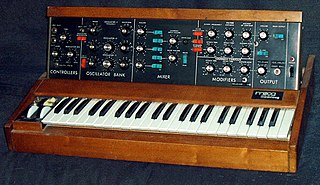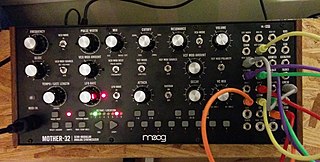Related Research Articles

An electronic musical instrument or electrophone is a musical instrument that produces sound using electronic circuitry. Such an instrument sounds by outputting an electrical, electronic or digital audio signal that ultimately is plugged into a power amplifier which drives a loudspeaker, creating the sound heard by the performer and listener.

Robert Arthur Moog was an American engineer and electronic music pioneer. He was the founder of the synthesizer manufacturer Moog Music and the inventor of the first commercial synthesizer, the Moog synthesizer, which debuted in 1964. In 1970, Moog released a more portable model, the Minimoog, described as the most famous and influential synthesizer in history. Among Moog's honors are a Technical Grammy Award, received in 2002, and an induction into the National Inventors Hall of Fame.

An analog synthesizer is a synthesizer that uses analog circuits and analog signals to generate sound electronically.

The Minimoog is an analog synthesizer first manufactured by Moog Music between 1970 and 1981. Designed as a more affordable, portable version of the modular Moog synthesizer, it was the first synthesizer sold in retail stores. It was first popular with progressive rock and jazz musicians and found wide use in disco, pop, rock and electronic music.

Modular synthesizers are synthesizers composed of separate modules for different functions. The modules can be connected together by the user to create a patch. The outputs from the modules may include audio signals, analog control voltages, or digital signals for logic or timing conditions. Typical modules are voltage-controlled oscillators, voltage-controlled filters, voltage-controlled amplifiers and envelope generators.

CV/gate is an analog method of controlling synthesizers, drum machines, and similar equipment with external sequencers. The control voltage typically controls pitch and the gate signal controls note on-off.

Buchla Electronic Musical Instruments (BEMI) was a manufacturer of synthesizers and unique MIDI controllers. The origins of the company could be found in Buchla & Associates, created in 1963 by synthesizer pioneer Don Buchla of Berkeley, California. In 2012 the original company led by Don Buchla was acquired by a group of Australian investors trading as Audio Supermarket Pty. Ltd. The company was renamed Buchla Electronic Musical Instruments as part of the acquisition. In 2018 the assets of BEMI were acquired by a new entity, Buchla U.S.A., and the company continues under new ownership.

Moog Music Inc. is an American synthesizer company based in Asheville, North Carolina. It was founded in 1953 as R. A. Moog Co. by Robert Moog and his father and was renamed Moog Music in 1972. Its early instruments included the Moog synthesizer, followed by the Minimoog in 1970, both of which were highly influential electronic instruments.

The Moog synthesizer is a modular synthesizer invented by the American engineer Robert Moog in 1964. Moog's company, R. A. Moog Co., produced numerous models from 1965 to 1981, and again from 2014. It was the first commercial synthesizer and established the analog synthesizer concept.
Arturia is a French electronics company founded in 1999 and based in Grenoble, France. The company designs and manufactures audio interfaces and electronic musical instruments, including software synthesizers, drum machines, analog synthesizers, digital synthesizers, MIDI controllers, sequencers, and mobile apps.
The Memorymoog is a polyphonic electronic music synthesizer manufactured by Moog Music from 1982 to 1985, the last polyphonic synthesizer to be released by Moog Music before the company declared bankruptcy in 1987. While comparable to other polyphonic synthesizers of the time period, such as the Sequential Circuits Prophet-5 and Oberheim OB-Xa, the Memorymoog distinguished itself with an additional, 3rd audio oscillator per voice and greater preset storage capacity.

Donald Buchla was an American pioneer in the field of sound synthesis. Buchla popularized the "West Coast" style of synthesis. He was co-inventor of the voltage controlled modular synthesizer along with Robert Moog, the two working independently in the early 1960s.

The Minimoog Voyager or Voyager is a monophonic analog synthesizer, designed by Robert Moog and released in 2002 by Moog Music. The Voyager was modeled after the classic Minimoog synthesizer that was popular in the 1970s, and is meant to be a successor to that instrument.

A synthesizer is an electronic musical instrument that generates audio signals. Synthesizers typically create sounds by generating waveforms through methods including subtractive synthesis, additive synthesis and frequency modulation synthesis. These sounds may be altered by components such as filters, which cut or boost frequencies; envelopes, which control articulation, or how notes begin and end; and low-frequency oscillators, which modulate parameters such as pitch, volume, or filter characteristics affecting timbre. Synthesizers are typically played with keyboards or controlled by sequencers, software or other instruments, and may be synchronized to other equipment via MIDI.
Synthesizers.com is an American company based in Houston, Texas, and founded by engineer Roger Arrick in 1997 and beginning to take orders in 2000, which manufactures analog modular synthesizers for music and sound-effect creation.

The Grandmother is an analog semi-modular subtractive, 32-key synthesizer released by Moog Music Inc., incorporating circuits based on the Moog modular synthesizer Model 15 and the Minimoog.

The Mother-32 is a semi-modular analog synthesizer. Introduced in 2015, it was the first tabletop unit produced by Moog Music. It has a single voltage controlled audio oscillator, a voltage controlled low frequency oscillator, a voltage controlled filter switchable between high and low pass, an AR envelope generator with switchable sustain, a voltage controlled amplifier, and a white noise generator. It also features a 32–step monophonic sequencer, a 13-note keypad, and a 32-point patch bay including assignable outputs. The Mother-32 is manufactured in Asheville, North Carolina.
References
- ↑ "Moog Model 15 App review". MusicRadar. Retrieved 2018-09-24.
- ↑ "Moog Model 15 App |". www.soundonsound.com. Retrieved 2018-09-24.
- ↑ "Moog's Latest iOS App Faithfully Recreates the Classic Model 15 Modular Synthesizer". WIRED. Retrieved 2018-09-24.